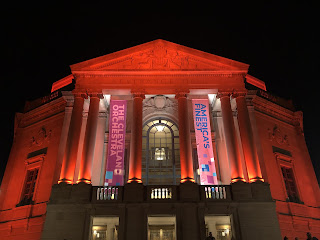The outside of Severance Hall was lit red for Valentine’s Day and the auditorium very well filled for last night’s concert with The Cleveland Orchestra and guest conductor Herbert Blomstedt and pianist Emanuel Ax. Blomstedt, now 95, is no longer the sprightly figure he was just a few years ago and held onto Ax’s arm as he slowly walked on stage.
The opening
work was Mozart’s Piano
Concerto No. 18 in B-flat major K. 456, thought by some to have been
written for his friend Maria Theresia von Paradis. Ax brought his usual polish along with keenly
sensitive treatment of the lower levels of dynamics. Playing soft, softer,
softest is among the most difficult challenges for even the greatest pianists (there
are numerous well-known pianists who never mastered it). The soloist was perfectly matched in dynamics
and interpretation by the orchestra and Blomstedt. The near capacity audience was so enthused
that applause was heard after the opening movement, with a sustained ovation
following the finale. Ax played an
encore, Chopin’s Nocturne in F
minor, Op. 55, No. 1, given in an unfussy manner.
Following
intermission, Blomstedt was assisted onto the stage by First Associate Concertmaster
Peter Otto, and sat on a piano bench placed on the conductor’s rostrum. Beethoven’s Seventh Symphony
is one of my five favorite works in that genre (the others being Mozart 41, Schubert
9, Brahms 4, and Rachmaninoff 2).
Blomstedt’s interpretation included all the repeats, which were most
welcome. The performance overall was noteworthy
for balance between the sections, natural phrasing, and sensible tempos. Everything was heard in proportion as it
should be in Beethoven’s most perfectly structured symphony. The second movement unfolded with logical
inevitability. The Scherzo featured a
Trio that was, for a change, not turned into an Adagio but rather played “much
less fast” as Beethoven indicated. The finale
was a marvel of controlled dynamism, given at a tempo brimming with life but
not at warp speed. The audience leapt to
its collective feet and gave a prolonged and richly deserved ovation. Blomstedt may be slowing down physically, but
he has lost nothing in musicality, interpretive power, or the ability to
project his ideas through the orchestra to the audience.


No comments:
Post a Comment